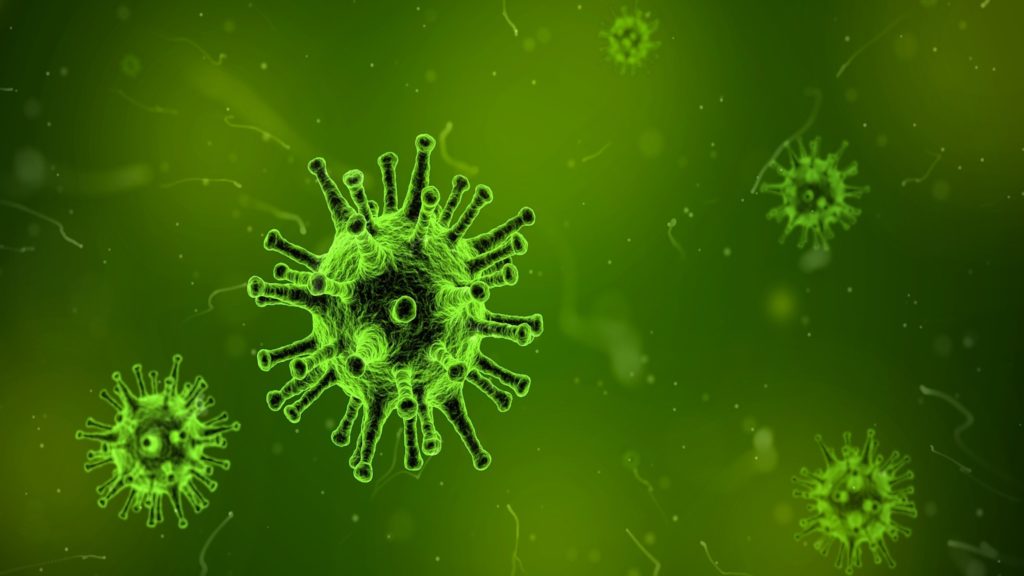A new antiviral drug candidate inhibits a broad range of coronaviruses, including the SARS and MERS coronaviruses, a multi-institutional team of investigators reports this week in Science Translational Medicine. The findings support further development of the drug candidate for treating and preventing current coronavirus infections and potential future epidemic outbreaks.
Coronaviruses are a genetically diverse family of viruses that infect birds and mammals, with most coronavirus strains limited to infecting only certain hosts. Human coronaviruses, for example, cause up to 30 percent of common colds.
In the last 15 years, however, coronaviruses have demonstrated their ability to jump into new species. Zoonotic (animal) coronaviruses have infected humans, causing severe acute respiratory syndrome (SARS) and Middle East respiratory syndrome (MERS), severe diseases with high mortality rates ranging from 10 percent for SARS to 40 percent for MERS. The MERS-coronavirus continues to cause new infections in the Middle East.
“There’s a real concern that the MERS coronavirus could escape broadly when millions of people visit Saudi Arabia for the Hajj,” said Mark Denison, M.D., Craig-Weaver Professor of Pediatrics and professor of Pathology, Microbiology and Immunology at Vanderbilt University School of Medicine.
But to date, there has been no effective antiviral drug for any known coronavirus, Denison noted.
Denison and his team at Vanderbilt have studied the basic biology of coronaviruses for more than 20 years. In an effort to find chemical tools that would allow them to probe viral replication, graduate student Brett Case screened a series of compounds selected and provided by Gilead Sciences.
Case demonstrated that one of the compounds was highly active against coronaviruses in cultured cells. The finding was a surprise, Denison said, because compounds in the same class (nucleoside analogs) have normally failed to inhibit coronavirus replication.
The compound, called GS-5734, is currently in clinical development for treatment of Ebola virus disease.
Denison’s longtime collaborator Ralph Baric, Ph.D., at the University of North Carolina and his team demonstrated that GS-5734 inhibits SARS-coronavirus and MERS-coronavirus replication in multiple in vitro systems, including cultures of primary human airway epithelial cells, which are the cells infected by respiratory coronaviruses.
The researchers also showed that GS-5734 was effective against a circulating human coronavirus, bat coronaviruses, and bat coronaviruses that are considered “prepandemic” because they can infect cultured human cells.
Using a mouse model of SARS, the investigators demonstrated that both prophylactic (before infection) and early therapeutic (soon after infection) administration of GS-5734 reduced viral load in the lungs and improved respiratory functions.
“This compound shows broad activity against a variety of human and animal coronaviruses and represents an exciting potential therapeutic for a family of viruses prone to emergence from animal reservoirs,” Denison said.
Denison and his team at Vanderbilt will continue to use the compound “as a probe to try to understand the biology of the virus, how and why this drug works, and to identify new targets for inhibiting coronaviruses,” he said.
“This is an exciting example of how pursuing fundamental research to understand the mechanisms of virus replication and pathogenesis can lead to an important compound with therapeutic potential.”
The research also illustrates the power of long-term collaborations and of public-private partnerships, Denison said. Denison and Baric have collaborated for 17 years to study coronavirus biology. Their efforts to identify coronavirus antiviral drugs in cooperation with Gilead Sciences have been supported by the Antiviral Drug Discovery and Development Center, which is funded by the National Institutes of Health (grant AI109680) and directed by Richard Whitley, M.D., at the University of Alabama at Birmingha

 Researchers identify antibodies that may make coronavirus vaccines unnecessary
Researchers identify antibodies that may make coronavirus vaccines unnecessary People who practice intermittent fasting experience less severe complications from COVID-19
People who practice intermittent fasting experience less severe complications from COVID-19 U.S. FDA issues risk of heart inflammation after Novavax COVID vaccine
U.S. FDA issues risk of heart inflammation after Novavax COVID vaccine Chemical found in leafy greens shown to slow growth of COVID-19 and common cold viruses
Chemical found in leafy greens shown to slow growth of COVID-19 and common cold viruses